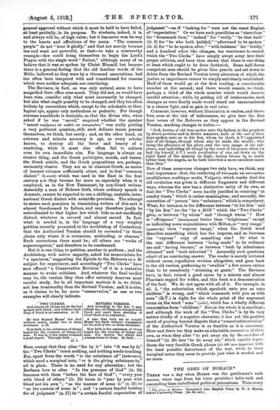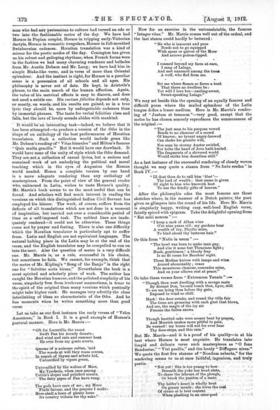THE ODES OF HORACE.* THERE was a day when Horace
was the gentleman's vade mecum, when tags from his verse garnishe I table-talk and resounding lines embellished political perorations. Then every
• The 01:4 of Horace. Traralatad into English Verse by W. S. Morris. Oxford University Press. [8s. 6d. net.]
man who had any pretensions to culture bad turned an ode or two into the lashiOnable metre of the day. We have bad Horace-in Popian couplet, Horace in tripping early-Victorian dactyls, Horace in romantic irregulars, Horace in full-mouthed
• Swinburnian cadences.. Horatian translation was a kind of mirror for the poetic: modes of the day. Conington has given
• us his robust and galloping rhythms; when French forms were in the fashion we had many charming rondeaux and ballades
from Mr. Austin Dobson and Mr. Lang ; we have had him in
simple Blake-like :verse, and in verse of more than Oriental • splendour.. And the instinct is right, for Horace in a peculiar sense is a-. possession.• of all schools and all ages. His • philosophy is never out of date. He kept, in Aristotle's .phrase, to the main- march of the human affection. Again,
the value of.his metrical effects is easy to discern, and does 'not need a subtle' ear. His curiosa felicilas depends not only,
or mostly, on words, and his results are gained, as in a true lyric they should be,- more by unforgettable cadences than -by immortal-phrases. - The taste for verbal felicities rises and falls, but love of lovely sounds abides with mankind.
It would be 'an 'interesting task—indeed, we believe that it has been attempted=to produce a version of the Odes in the )11 fitt pe. of an anthology of the best performances of Horatian translators. Such a collection would include gems like -Mr. Dobson's reading of " Vitas hinnules " and Milton's famous Quis multa gracilis."' But it would haie one drawback. It 'would have none of. the unity of style which the Odes demand. They areaoka -Collection of casual lyrics, but a serious and sustained --work of -art embodying the political and moral teaching. - which in the eyes of Augustus the Roman world needed; Hence *a complete version by one hand is a more adequate rendering than any anthology of -Masterpieces. 4 From the point of view of the general reader Who, unlearned- in Latin, wishes to taste Horace's quality, Mr:"Marris'a book: teethe to us the most useful that can be found. And stiholars Will find much interest in reading the 'versions on whiehAhie distinguished Indian Civil Servant has employed his leisure:. The work, of course, suffers from the -defects- of all translations which are not done in a moment
Of inspiratiOn, but-carried out-over a considerable period of time as a.-;self-imposed task. The noblest lines are inade- quately rendered—it could - not be otherwise. These things
Come not by 'prayer and fasting. There is also one difficulty which the Horatian -translator is particularly apt to suffer from. Latin and English are not equivalent languages. The natural halting place in the Latin may be at the end of the verse, and -the-English translator may be compelled to rim' on into. thenext: Also the question of metre is a very difficult one. Mr. Mamie is;' as a rule, successful in his choice, but sometimes he falls. We cannot, for example, think that the metre of Mr. Kipling's "Song of the Banjo" is the right one for " Solvititr atria hiems." Nevertheless the book is a
most' spirited and scholarly piece of work. The author has caught the Horatian humour, and the polished simplicity of his
verse, singularly free from irrelevant mannerisms, is truer to the spirit of the original than many versions which poetically. might take higher 'rank.- He manages very adroitly the close Intel-linking of ideas so characteristic of the Odes. And he has moment's when he writes something more than good
verse. -
Let us take as our first instance the early verses of "Velox Amoenum," in Book I. It is a good example of Horace's pastoral manner. Here is Mr. Marris
"Oft foi Lucretilis the sweet Swift Pan his Arcady deserts ; And wind and rain and summer beat He ever from my goats averts.
Queens of ,a noisome sultan, 'mid The moods at will they roam serene, In search of thyme and arbute hid, Unterrified by vipers green, Untroaled b3i-the wolves of Mars,
Vy-Tyndaris, when once among -, 1Jstid's slopes and polished
,•-• -The fairy pipes- of Pan have rung.
The gods have care of me ; my Muse `Tincls'favour, and the prayers I make: Here shall sawn of plenty loose
Its Country tribute for thy sake.", Now 'for an exercise in the untranslatable, the famons "Integer vitae." Mr. Marris comes well out of the ordeal, and the last'stanza could hardly be bettered :
"He who is innocent and pure Needs not to go equipped With spear or quiver of the Moor And arrows poison-tipped.
•
I roamed beyond my farm at ease, I sang of Lalage, And met unarmed among the trees A wolf, who fled from me.
•
Set me where flames so fierce a heat. That there no dwellers be :
Yet will I love her—smiling-sweet, Sweet-speaking Lalage."
We may set beside this the opening of an equally famous and difficult poem where the mailed splendour of the Latin tongue defies a lesser medium. Here is Mr. Marris's render- ing of " Justum et tenacem "—very good, except that the metre he has chosen scarcely reproduces. the sonorousness of the original :— .
"The just man to his purpose vowed Bends to no clamour of a crowd Of knaves; no tyrant angry-browed Can shake his granite will,
Nor scan by stormy Auster swirled, Nor bolts the band of Jove hath hurled. The fragments of a shivered world Would strike him dauntless still."
As a last instance of the successful rendering of closely woven thought we may quote a- stanza from " Ne forte credas ".in
Book IV.:—
" IIl dost thou do to call him blest '— The lord of wealth : that name is given. Of right to him who knoweth best To use the kindly gifts of heaven."
After the philosophic odes the most famous are those sketches where, in the manner of a Dutch painter, the poet gives us glimpses into the round of his life. Here Mr. Marris is singularly happy, writing easy, well-bred English verse, faintly spiced with epigram. Take the delightful opening from " Est mini nonum " "I keep a cask of Alban wine
O'er nine years old: my gardens bear A wealth of ivy, Phyllis mine, To bind about thy lustrous hair."
Or this from "Natis in usum" :-
" The bowl was born to make man gay, And o'er it none but Thracians fight;' Hush, gentlemen ! a bloody fray
Is no fit scene for Bacchus' sight.
Those Median knives with lamps and wine& Accord abominably ; cease This monstrous clamour, comrades mine, And on your elbows rest at peace."
Or take these verses from " Extremum Tanain "
"Though thou wert dwelling with a savage mate By distant Don, 'twould touch thee, Lyce, still. To see me lying thus before thy gate, Exposed to wind so chill.
Hark ! the door creaks, and round thy villa fair The trees are groaning with each gust that blows, And see, the magic of the icy air Freezes the fallen snows.
• Though knotted oaks were sooner bent by prayer. And Moorish snakes more pitiful to pain, Be warned ! my bones will not for ever bear Thy door-steps, and this rain."
But Mr. Marris—and it is a proof of his quality—is at his best where Horace is most exquisite. He translates into, limpid and delicate verse such masterpieces as " 0 fons Bandusiae;" " Vial puellis," and the lovely " Diffugere nives." We quote the first five stanzas of " Nondum subacta," for the rendering seems to us at once faithful, ingenious, and truly got yet ! She is.too young to bow Beneath the yoke her head elate, To share the labours of the.plough, Oi brook the passion of a mate.
Thy heifer's heart is wholly bent On grassymeads ; she loves the cool
Of rivers or is best content' ' When plashing /man osier-pool
Among the calves. Oh, never sigh For turning grapes ! In gorgeous hue Comes Autumn speedily to dye The bluish clusters deeper blue.
Soon she herself will dog thy feet : That pride of youth, that reckons gain The years thou mourned, passes fleet, - And Lalage will chase her swain."
We have said already that sometimes Mr. Harris writes more than good verse. As a proof we will quote these four lovely lines on Europa from " Impios parrae " in Book III. :— " Of late intent on meadow flowers She plaited wreaths the Nymphs to please : Now she discerns through Night's dim hours Only the stars and seas."






































 Previous page
Previous page